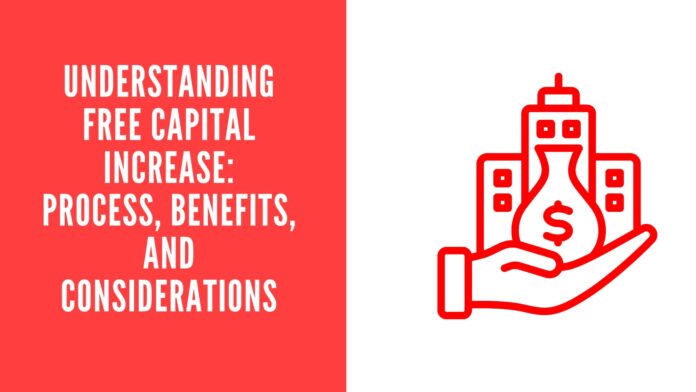Free capital increase, also known as bonus issue or bonus share issue, is a corporate finance strategy where a company issues additional shares to existing shareholders without receiving any payment in return. In this comprehensive guide, we’ll explore what free capital increase is, how the process works, its benefits, and important considerations for shareholders.
What is Free Capital Increase?
Free capital increase involves issuing additional shares to existing shareholders on a pro-rata basis without requiring them to pay any consideration for the new shares. Instead of receiving cash, shareholders receive additional shares in proportion to their existing ownership in the company. This process does not result in any inflow of funds to the company but increases the number of shares outstanding.
Process of Free Capital Increase
- Board Approval: The company’s board of directors approves the decision to issue additional shares as a free capital increase and sets the terms of the bonus issue, including the ratio of bonus shares to existing shares.
- Shareholder Approval: Shareholders may need to approve the free capital increase, especially if it involves a significant increase in the company’s share capital or if it requires an amendment to the company’s articles of association.
- Issuance of Bonus Shares: The company issues bonus shares to existing shareholders in proportion to their existing shareholdings. For example, if a shareholder owns 100 shares and the bonus issue ratio is 1:1, the shareholder will receive an additional 100 shares as bonus shares.
- Recording and Reporting: The company records the issuance of bonus shares in its books and reports it to regulatory authorities in compliance with applicable laws and regulations.
Benefits of Free Capital Increase
- Enhanced Shareholder Value: Free capital increase increases the number of shares outstanding without diluting the ownership stake of existing shareholders. As a result, it can enhance shareholder value by increasing the liquidity and marketability of the company’s shares.
- Tax Efficiency: Since no cash is involved in the transaction, free capital increase may be more tax-efficient for shareholders compared to other forms of capital increase that involve cash payments.
- Retained Earnings Utilization: Bonus shares are typically issued out of retained earnings or other reserves, allowing the company to utilize its accumulated profits to reward shareholders without distributing dividends.
Considerations for Shareholders
- Dilution: While free capital increase does not dilute the ownership stake of existing shareholders, it dilutes their earnings per share (EPS) and other financial ratios due to the increase in the number of shares outstanding.
- Market Reaction: The market’s reaction to a free capital increase can vary depending on factors such as the company’s financial performance, market conditions, and investor sentiment.
- Tax Implications: Shareholders should consider the tax implications of receiving bonus shares, including potential capital gains tax liabilities upon the sale of bonus shares.
Conclusion
Free capital increase is a corporate finance strategy that allows companies to reward shareholders by issuing additional shares without requiring them to pay any consideration. By understanding the process, benefits, and considerations associated with free capital increase, shareholders can make informed decisions about participating in such offerings and assess their impact on the company’s financial position and shareholder value.

